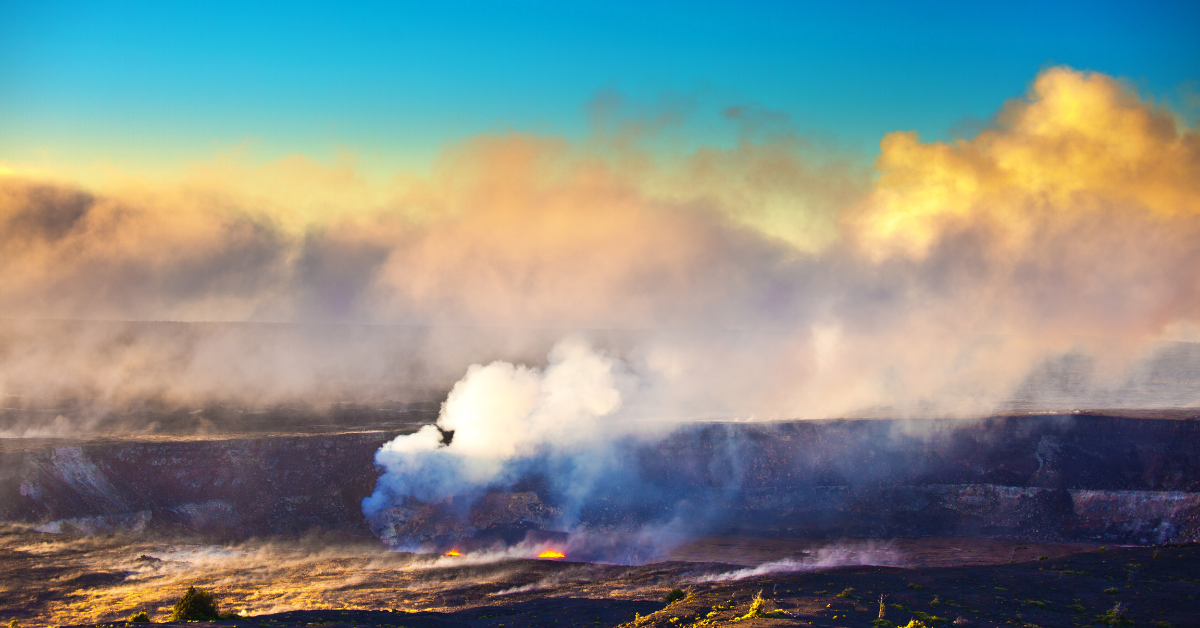Hawai‘i Volcanoes National Park is a truly unique place where you can feel the heartbeat of the Earth up close. Japanese visitors often highlight not only the overwhelming power of nature but also the cultural resonance and opportunities for learning that make their journey unforgettable.
The Natural Power That Impresses Japanese Travelers
Many Japanese tourists express that they felt “the Earth is alive” when witnessing the volcanic activity. Especially the smoke and lava flows of Kīlauea Volcano leave an unforgettable impression, very different in scale from volcanoes in Japan. Seeing lava during the day conveys raw power, while at night the glowing red scenery is described as “both frightening and beautiful”.
Because Japan is also a country familiar with earthquakes and volcanic risks, Japanese travelers often carry both reverence and caution toward volcanoes. This dual feeling makes their experience in the park uniquely intense.
| Time of Visit | Japanese Impressions | Characteristics |
|---|---|---|
| Daytime | “I felt the heartbeat of the Earth” | Power of smoke and flowing lava |
| Nighttime | “Mysterious and dreamlike” | Beautiful glow of red lava |
Cultural Resonance with Japanese Traditions
Japan has a long tradition of hot springs and volcano worship, treating nature with reverence. Because of this, many Japanese visitors feel that the Hawaiian perspective resonates with their own culture. In particular, learning that Hawaiians worship the volcano as the goddess Pele leads to impressions such as “it feels similar to Japan’s Shinto traditions”.
For many, this experience becomes more than sightseeing; it becomes an opportunity for reflection and cultural understanding.
| Cultural Element | Similarities with Japan | Japanese Impressions |
|---|---|---|
| Pele Worship | Mountain and nature worship | “It feels close to Japanese Shinto” |
| Hot Spring Culture | Blessings of volcanoes | “I felt the natural power that connects to hot springs” |
Travel Styles Preferred by Japanese Visitors
Japanese travelers often visit with family or close friends in small groups rather than large tours. As a result, their feedback often includes comments such as “I could enjoy it calmly” and “it was safe even for elderly parents or small children”.
They also tend to choose shorter hikes or viewpoints rather than long treks, adjusting their pace to time and physical ability. This makes the park appealing across generations.
| Travel Style | Japanese Characteristics | Impressions |
|---|---|---|
| Small Groups | Families and friends | “We could enjoy sightseeing peacefully” |
| Short Routes | Viewpoints and short hikes | “We enjoyed nature without overexertion” |
| Educational Trips | With children | “It was an ideal learning experience” |
Emotional Reactions Among Japanese Visitors
Impressions from Japanese visitors can be grouped into surprise, inspiration, fear, and learning. These mixed emotions stem from the dual nature of volcanoes: sources of natural disasters, yet also providers of fertile land and blessings. Japanese travelers are particularly sensitive to this complexity.
| Emotion | Content | Typical Japanese Comments |
|---|---|---|
| Surprise | Scale of nature | “Much larger than I imagined” |
| Inspiration | Beauty | “An unforgettable view” |
| Fear | Danger | “I was overwhelmed by nature’s power” |
| Learning | Cultural insight | “It made me think about the relationship between nature and humans” |
Recommendations for Foreign Visitors
From Japanese impressions, several recommendations for foreign visitors emerge. These highlight how to get the most out of the park safely and meaningfully.
| Recommended Activity | Reason | Based on Japanese Feedback |
|---|---|---|
| Night Viewing | To feel a dreamlike atmosphere | “Frightening yet beautiful” |
| Cultural Learning | Understanding Pele worship | “Similar to Japanese Shinto” |
| Short Hikes | Accessible for all ages | “We could enjoy without strain” |
| Educational Trips | Teaching children about nature | “It was a learning opportunity” |
Overall Appeal for Japanese Visitors
Overall, Japanese visitors evaluate Hawai‘i Volcanoes National Park as a place of “overwhelming natural power, cultural resonance, family-friendly safety, and educational value”. For them, it is not just a sightseeing spot but “a memorable life experience”.
Foreign visitors can also gain a deeper, more fulfilling journey by understanding this multi-faceted appeal.
| Perspective | Japanese Evaluation | Meaning for Foreign Visitors |
|---|---|---|
| Nature | Overwhelming power | Feel the strength of the Earth |
| Culture | Discovering similarities | Deepen cross-cultural understanding |
| Travel Style | Comfortable pace | Suitable for all generations |
| Learning | Educational value | Ideal for children and students |
Conclusion
For Japanese travelers, Hawai‘i Volcanoes National Park is a place where fear and awe, excitement and serenity coexist. They are overwhelmed by its scale, moved by its beauty, and inspired by the cultural parallels they discover. Families in particular appreciate its safety and accessibility. For foreign travelers, too, it is a site where nature and culture intertwine to create a lasting impact.






